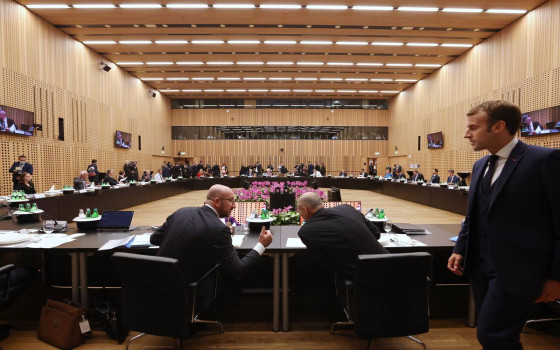
European summit in Brussels tomorrow to discuss international and regional threats .. Britain and NATO participate ... President of the Union: Europe needs to take greater responsibility for its defense

- Europe and Arabs
- Sunday , 2 February 2025 10:44 AM GMT
Brussels: Europe and the Arabs
Brussels, the capital of Belgium and the European Union, will host a summit of the leaders of the countries of the unified bloc tomorrow, Monday, February 3, under the title "European Defense", and the federal institutions in Brussels published the text of an invitation letter from the President of the Council of the Union, Antonio Costa, to the members of the Council, who are the leaders of the member states, which stated: "I believe that we share a similar assessment of the threats facing Europe. Russia's aggression against Ukraine has brought high-intensity war back to our continent - violating the fundamental principles of international law and threatening European security - alongside increasing hybrid and cyber attacks on member states, their economies and societies. Peace in Europe depends on Ukraine winning a comprehensive, just and lasting peace. This geopolitical context, also characterized by the situation in the Middle East, will remain a challenge for the foreseeable future.
The purpose of this meeting is to prepare the ground for the decisions we will have to make and to provide guidance to the Commission and the High Representative as they prepare a White Paper on the future of European defense, which will cover joint defense initiatives and the resources needed to develop them. As stipulated in the leaders' agenda, my goal is to return to the topic of defense at the European Council in June 2025.
I propose that we base our discussions on two main principles.
First, Europe needs to take greater responsibility for its own defence. It needs to become more flexible, more efficient, more independent and a more reliable actor in the field of security and defence. In doing so, it will also become a stronger transatlantic partner, including in the context of NATO, with full respect for the security and defence policy of individual Member States and taking into account the security and defence interests of all Member States.
In recent years, Member States have indeed increased their national defence spending. But we know that significant additional defence investments are needed to replenish stockpiles, raise our defence readiness to meet a wide range of threats – focusing on strategic priorities and critical capability gaps – and strengthen the European defence technological and industrial base accordingly.
Second, Member States will always remain responsible for their armed forces. At the same time, we have a common interest in cooperating more closely at European level in order to maximise the scale of our economies and reduce costs, ensure interoperability, ensure stable and long-term demand – in order to give greater predictability to our industry – and prevent redundancies. The level of investment, including in research and development, required to strengthen our capabilities is beyond the reach of individual Member States acting alone. Moreover, effective defence is a “common good” that benefits all Europeans.
Increased defence investment should also contribute to strengthening the overall economic competitiveness and cohesion of the EU through an industrial sector capable of developing technological excellence across the EU and contributing to job creation. The objective of strengthening European defence should be taken into account in all relevant Union policies.
In order to prepare the next steps, I would suggest that we focus our discussion on the following questions:
Which defence capabilities should we develop collaboratively as a priority, and how should we define them, given their importance for the EU’s collective security?
Do we agree to spend more and better together? How can we accelerate the mobilisation of private finance, and through which EU instruments? How can we use the EU budget optimally, in the short, medium and long term? Given the significant funding needs, what additional joint options can be considered?
How can we strengthen and deepen existing partnerships? What are our objectives and priorities with our European partners outside the EU?
I have invited the NATO Secretary General to join us for lunch. This will provide us with a timely opportunity to discuss the most pressing issues relating to defence, in particular our support for Ukraine, as well as EU-NATO cooperation.
The UK Prime Minister will join us for a working dinner ahead of the EU-UK Summit later this year. This will be the first time that Prime Minister Starmer will meet all 27 leaders. The UK is a key partner for the EU, particularly in the area of defence. I expect the discussion to focus on this dimension of our relationship.
We will begin our meeting at 11.00 am with an exchange of views with the President of the European Parliament. We will then have a first discussion, followed by lunch with Secretary General Rutte, a second session among ourselves and dinner with Prime Minister Starmer. Finally, I would like to thank Polish Prime Minister Donald Tusk, whose country currently holds the rotating EU Presidency, for the close cooperation in the preparations.












No Comments Found